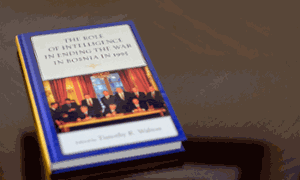JMU Engages Declassified Documents
College of Integrated Science and EngineeringBy: Daniel Vieth
Posted: December 7, 2015
On October 1st, 2013, the United States Central Intelligence Agency (CIA) and Clinton Presidential Library made history by releasing more than 300 previously classified documents “It was just all the stars coming into alignment, with the CIA releasing the documents and being interested in having scholars take a look at them,” said Walton. “It’s just a match made in heaven for the engaged university.” related to America’s involvement in the 1992-1995 Bosnian War - the earliest any collection of CIA documents had ever been released. One of the key factors in releasing these documents was for scholars to study America’s successful use of intelligence to help end the war. To encourage universities like JMU to become involved, the CIA reached out to Intelligence Analysis (IA) professor and former CIA analyst Dr. Timothy Walton six months prior to the release. “It was just all the stars coming into alignment, with the CIA releasing the documents and being interested in having scholars take a look at them,” said Walton. “It’s just a match made in heaven for the engaged university.” With Walton’s planning, JMU hosted an international academic conference, published a compilation of the scholarly research from the conference, and started a connection with the Scholarship Fund for Gifted Students at the American University in Bosnia and Herzegovina.
The conference, entitled ‘Intelligence and the Transition from War to Peace,’ was hosted at JMU on March 19-20, 2014. “The conference was a multidisciplinary examination of the role of intelligence in ending the fighting and genocide of the crisis in Bosnia,” explained JMU President Jonathan Alger, who gave the opening remarks at the ceremony. “We brought together scholars from around the United States to look at the newly released documents from the CIA archives and the Clinton Presidential Library to help us understand this process.” Some other attendees at the conference included former Clinton Administration principal deputy Jan Lodal, who gave the keynote address, JMU professors Dr. Mark Piper and Dr. Pia Antolic-Piper, former naval intelligence officer Dr. Jonathan Smith, and a team of intelligence officers from the Netherlands. “I was delighted at the people we were able to get,” Walton exclaimed. “We had people who really had some good and interesting stories to tell.”
Following the conference, Walton edited and compiled the scholars’ research into a book, ‘The Role of Intelligence in Ending the War in Bosnia in 1995,’ which was published on  September 26, 2014. “The idea behind this book was to have people from different academic backgrounds look at the exact same documents to provide an overall integrated picture of the Bosnian War,” explained Walton. “We had experts on religion, political science, linguistics, a military analyst, an intelligence officer and more, so we had all of these angles and got a really well-rounded view.” For example, a group of JMU professors including the Pipers wrote ‘Beyond Bosnia: Ethical Reasoning in Political Deliberations about Humanitarian Intervention,’ which argues that larger ethical reasoning should have been involved in the deliberations following the war. “The conference and book were an excellent example of JMU scholars making novel contributions on a timely, important topic with a variety of experts,” said Dr. Mark Piper. “The editing work done by Dr. Walton was also remarkably efficient and very high quality.”
September 26, 2014. “The idea behind this book was to have people from different academic backgrounds look at the exact same documents to provide an overall integrated picture of the Bosnian War,” explained Walton. “We had experts on religion, political science, linguistics, a military analyst, an intelligence officer and more, so we had all of these angles and got a really well-rounded view.” For example, a group of JMU professors including the Pipers wrote ‘Beyond Bosnia: Ethical Reasoning in Political Deliberations about Humanitarian Intervention,’ which argues that larger ethical reasoning should have been involved in the deliberations following the war. “The conference and book were an excellent example of JMU scholars making novel contributions on a timely, important topic with a variety of experts,” said Dr. Mark Piper. “The editing work done by Dr. Walton was also remarkably efficient and very high quality.”
Early on in the process of putting the conference and book together, the scholars began discussing what to do with the royalties of the book. “Typically professors and scholars don’t do it for the money,” Walton explained. “We started talking and decided it wouldn’t make a difference with the money for us as individuals, but if we put it all together we could give it to some charitable organization.” After looking at a number of charities around Harrisonburg, the group realized that even a modest sum could make a much larger difference for individuals in Bosnia. With a little research, Walton found the Scholarship Fund for Gifted Students at the American University in Bosnia and Herzegovina. “Students in Bosnia are like students everywhere,” said Walton. “They want to get a good job, have a family, and career. But Bosnia is one of the hardest places to make that happen.” This scholarship intends to give Bosnian students a greater education and help them escape from poverty and crime in their country. “There’s some good and smart kids in Bosnia, and what they need is an education,” Walton added.
“This conference exemplified each of the three pillars of engagement: engaged learning, community engagement, and civic engagement,” President Alger explained. “It was a model for what JMU should be: a place of convening and learning where serious people, sometimes from far beyond Harrisonburg, can come together to discuss and debate complex and challenging issues.” Thanks to the careful planning of Walton and the contributions of scholars from JMU and beyond, the conference and book on intelligence’s role in the Bosnian War have been a success, with the book’s proceeds going directly to helping students in Bosnia achieve their goals.

